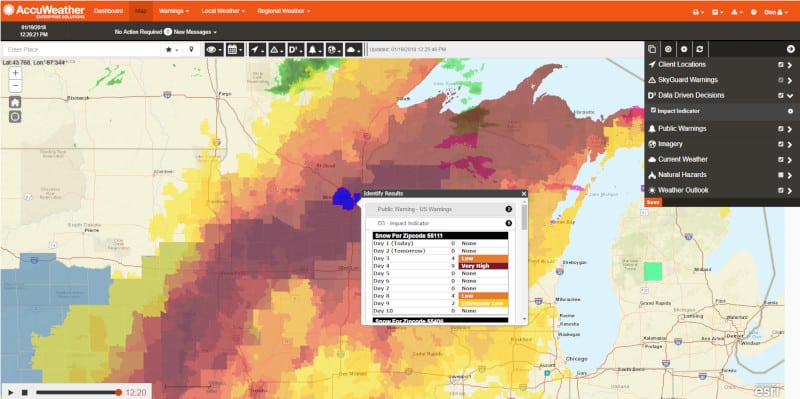One of the great unknowns for trucking companies is weather. That is because a fleet manager or dispatcher rarely knows what the weather will be three or four weeks from now when accepting a load. On top of it, drivers can face various weather conditions throughout their day, particularly in the nation’s heartland as storms roll across the country.
While carriers and shippers can’t change the weather, they can learn to work with it – or at least around it. That’s where the expertise of a company like AccuWeather comes in handy.
AccuWeather is best known for its forecasts, with millions visiting its site, www.accuweather.com, on a daily basis. But the company provides more than just local weather forecasts; its Enterprise Solutions (AES) business has been working with companies across the business spectrum for years in crafting “actionable and tailored weather solutions,” explains Jonathan Porter, vice president of business services and general manager of Enterprise Solutions. “There’s different levels of information we can provide,” he notes, with a particular focus on surface transportation.
Weather can have a severe impact on the nation’s freight movement, regardless of mode. On the highways alone, 23% of all delays are caused by weather, adding time and cost to shipments. It is estimated that weather costs trucking companies up to $3.5 billion a year, according to the U.S. Federal Highway Administration, and 12% of truck delays are a result of weather. Trucking companies lose an estimated 32.6 billion vehicle hours a year due to weather.
And it’s not just rain, which can slow a truck’s average speed by up to 25%, but snow that has a major impact. Over 70% of the nation’s roads are in areas that receive more than 5 inches of snow a year – and many areas receive much more.
Fleets or shippers that are not prepared for inclement weather are often faced with delays or cancellations. In addition, weather can increase maintenance needs for vehicles, adding even more cost and delay.
Accuweather has leveraged its 130-plus meteorologists to provide in-depth, customized weather solutions for enterprises for years now, helping businesses prepare for flash floods, high winds, snowstorms, tornadoes and more.
It’s signature service is its SkyGuard warnings, which provide “just-in-time” weather warnings of impending weather conditions that will impact operations. Clients include shippers and carriers, but also railroads who are at risk of flooding over rails. SkyGuard monitors a client’s assets and provides warnings, often earlier than the National Weather Service can, Porter says.
“Not all forecasts are created equal, and constantly Accuweather forecasts are ranked number one,” Porter says. “And very importantly, we’re looking at the impacts [to operations].”
The warnings can be issues based on actual vehicle location right down to specific mileposts. There is no one-size-fits-all solution, Porter notes, as operations vary and the solutions they need must match. For instance, a utility fleet that uses bucket trucks might be very concerned about winds over 25 mph but a trucking fleet may not care until the winds reach 50 mph.
“We provide weather warnings specific to their operations,” Porter says. “That extra time is critical … to move to safety.”

A great example of this was a disaster in Mexico that was averted on July 19, 2013. AccuWeather’s SkyGuard issued a flash flood warning for Mexico’s largest railroad, Ferromex, along 40 miles of track in the Copper River Canyon area in Northern Mexico. SkyGuard monitors over 5,000 miles of rail for Ferromex. That warning caused Ferromex to halt train traffic along that area until the next day. Upon inspecting the tracks, the railroad discovered parts of the rails washed away in the flooding. The AccuWeather warning prevented a likely train derailment.
AccuWeather won a 2018 meteorological award for its warning to Ferromex. Trucking fleets can take advantage of that same advanced warning system. Porter says that before Hurricane Sandy hit the Northeast in 2012, Accuweather provided a 9-day warning of a significant impact to operations to subscribers. In 2017, Houston area customers received a 7-day warning before Hurricane Harvey, helping them relocate assets out of the affected regions.
“The key thing we’re trying to do is enhance safety; we’re trying to save lives,” Porter says. “But also, we’re talking about reducing the negative impact from weather.”
One of the problems with fleets compiling their own weather information, Porter says, is that there is a lot of available data. “If you don’t know how to use the information…it’s just a bunch of meteorological mumbo jumbo,” he says. “You might as well not have had the information.”
To illustrate his point, Porter notes snowfall as an example. In the winter, some areas can see snowfall of several inches in a day. A fleet manager may decide to reroute trucks to avoid the snow – adding time and cost to the runs – but a deeper dive into the data might reveal that while the area will receive 4 inches of snow, the road temperatures will be high enough that it will not stick to the road. Those trucks have now been rerouted for no reason.
“It’s so important to note the impact of the various conditions,” Porter notes. “It’s not just the weather, it’s the impact to our clients.”
Enterprise customers also have the advantage of consulting with an AccuWeather expert when needed to assess potential conditions. Porter says conference calls with fleets occur regularly ahead of major weather events.
The company’s SkyGuard product was added to mobile devices earlier this year and a new product, MinuteCast, will launch later this year. MinuteCast will offer minute-by-minute weather updates based on waypoints and will include sunglare forecasts. Sunglare doesn’t seem like a significant weather event, but it can dramatically slow traffic speeds.
Customers also have access to seasonal outlooks and forecasts extending out several weeks. Different business models are available based on customer needs and enterprise size.










